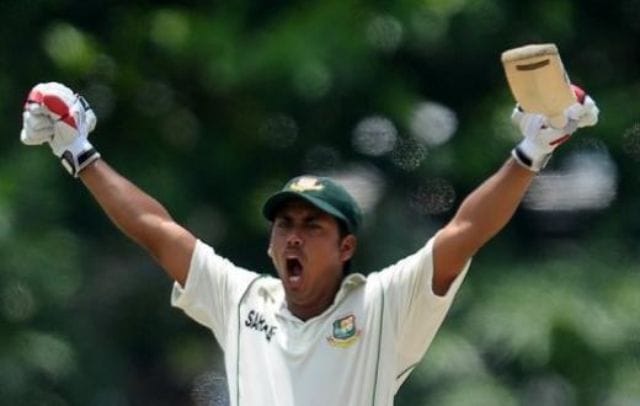Ashraful's return and remaking of our cricketing history
Oh Bangladesh -- what an innings played by the tigers and what an extraordinary display of magnificent cricket! The captain's knock of the first ever double century and Ashraful's near 200 are not the only milestones Bangladesh has achieved -- Nasir's 100 and Mominul's debut half century cannot be undermined either. Overall, the record score made by the Tigers against one of the higher ranked test playing nations have made Bangladesh and its cricket-crazy crowds able to say -- "Yes, We Can!"
With this note, can we claim -- Bangladesh as a cricketing team has reached its maturity? In one of my articles in The Daily Star (March 23, 2011) published in the wake of the less-than-satisfactory performance by the Bangladesh cricket team in the 2011 Cricket World Cup, I clearly indicated the need for maintaining a squad with experienced players and relying less on the so-called "new blood." In contrast with other major cricketing nations, Bangladesh has been typically allowing its key players to retire too early from the test and the one-day cricket leaving little or no experience in the make-up of the team.
Is it changing? I would say 'yes' -- at least to certain extent. It may not, however, be a deliberate act -- but somehow team Bangladesh is moving towards a positive direction. Selection of Ashraful for the Sri Lanka test was a blessing in disguise and Asharaful has just proved that 'experience matters.' Although Mushfiqur has made the first double for Bangladesh, by staying in the crease for the longest ever time by a Bangladeshi batsman while facing 417 balls, Ashraful has definitely put himself in the record book as well (in addition to other records).
There was a general opinion that there was no scope of getting Ashraful back in the team despite his superb performance in the domestic league. The so-called 'inconsistent' performance in the past was the root cause of such an opinion, it was argued. I tried to contest their views on the ground that for any great cricketer there is always a good time and bad time, lean period as well as productive. It happened to greats like Ricky Ponting, Brian Lara and even Sachin Tendulkar!
We should have given Ashraful a forthright chance at least based on his on-field performance in the recent months. Thank God, he got that chance but as a replacement following injuries to a number of regular players! The selectors did not have an option at the end but to allow Ashraful one final chance albeit reluctantly! His re-entry into the team and the subsequent performance of Bangladesh prove one thing, i.e., we shouldn't ignore our experienced players, even if they have temporarily faltered.
In the current test squad, six players are of age between 24 and 28 (Ashraful being the oldest). In the last world cup squad, we had nine players between 21 and 23! The average age has gone up significantly from 22 to almost 24 in the last two years. It is an improvement as all great cricketing nations nurture the experienced players (with a necessary mix of 'new blood') because after the initial hiccups players who survive become the real assets and the sources of inspiration for the entire team.
Ashraful did suffer from lack of real guidance at the beginning of his career. Despite his stellar performance in his debut test match, he rapidly slipped from his 'rising star' form. With enormous pressure on his shoulder as a batsman, he was suddenly burdened with the responsibility of captaincy replacing Habibul Bashar. The decision to ditch Bashar was considered a wrong one despite his good performance as the Tigers' captain in the 2007 World Cup. It had dual negative impacts on the team, the loss of Habibul Bashar as a demoralised cricketer and the excessive pressure on Ashraful making him falter both as a batsman and a captain. Previously, similar episodes happened with respect to players such as Naymur Rahman and Khaled Mahmud Sujan.
Bangladesh has, therefore, been consistently in a mode to replace players without testing them for a reasonable period. Currently, Ashraful is the oldest player in the match -- he is only 28. However, in the world of cricket, there are numerous examples of players in their mid and late 30s who have still been contributing to their respective teams, e.g. Michael Clark, David Hussey, Afridi, Tendulkar, Dhoni, Chanderpaul, Shane Watson, Graeme Swann and many more.
I am not suggesting that the selectors should go back and find players still fit to play. Rather, it is important not to ditch someone prematurely from the existing list for showing any short-term unsatisfactory performance. Experience can only be gathered over a period of and no coach or guide can just implant it instantly.
Let us immortalise the achievement of today, learn from the past and hope that Bangladesh establishes itself as a mature, credible, consistent and illustrious cricketing nation in the world of cricket.
The writer is a freelance writer and an Associate Professor at RMIT University, Melbourne.


 For all latest news, follow The Daily Star's Google News channel.
For all latest news, follow The Daily Star's Google News channel. 


Comments